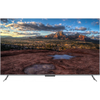A comparison of specs, key information, reviews, and best pricing from top retailers
Last updated -- hours ago | Report incorrect information
What we think

The PerfectRec TV team Learn more
Updated January 10, 2024·
If you favor watching movies and series, and are looking for solid dark room performance, the Amazon Omni QLED could be the better choice. It also has a higher overall picture quality, which might enhance your viewing experience across different content. However, if you spend a lot of time watching news, talk shows, or reality TV, and prefer a TV that performs well in bright rooms, the Samsung CU8000 is more suitable. Both TVs are similarly priced and have HDR support, but the Amazon model supports additional HDR formats like Dolby Vision and HDR10+, which may improve your experience with compatible content. Keep in mind that the Samsung has one less HDMI port than the Amazon model. Give Feedback
this description is based on the product variant with some specs and product variant with some specs. At the time of writing, the variant with some specs cost some dollars and the variant with some specs cost some dollars.
Advantages of the Amazon Omni QLED (LCD)
- Good for dark room
- Good for movies & TV
- Good for news, talk, & other TV
- Very good for cartoons & animation
Advantages of the Samsung CU8000 (LCD)
- Very good motion processing
Key differences
Picture Quality
7.7
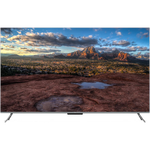

5.8
9.07/10
CONTRAST
4.92/10
8.2/10
COLOR VOLUME SCORE
6.9/10
LED FALD
PANEL TYPE
LED
VA
PANEL SUB-TYPE
VA
The Amazon Omni QLED (LCD) has good picture quality, while the Samsung CU8000 (LCD) has poor picture quality.
Movies & TV
7.8


5.3
9.07/10
CONTRAST
4.92/10
6.5/10
BLACK UNIFORMITY
6.1/10
6.6/10
UPSCALING
6.0/10
Yes
HDR10 SUPPORT
Yes
Yes
HDR10+ SUPPORT
Yes
Yes
DOLBY VISION SUPPORT
No
The Amazon Omni QLED (LCD) is good for movies & TV, while the Samsung CU8000 (LCD) is poor.
Gaming
6.4


5.5
6.1/10
RESPONSE TIME SCORE
4.9/10
8.0/10
INPUT LAG SCORE
8.7/10
3.2/10
MOTION PROCESSING
8.2/10
75.0/100
GAMING LOCAL DIMMING
0.0/100
6.5/10
GAME HDR BRIGHTNESS SCORE
5.8/10
The Amazon Omni QLED (LCD) is only fair for gaming, while the Samsung CU8000 (LCD) is poor.
The Amazon Omni QLED has a fair response time and very good input lag, which makes it suitable for gaming, while the Samsung CU8000 with poor response time may not handle fast-moving images as smoothly, affecting gaming performance despite its very good input lag. Both TVs have a 60Hz refresh rate, which is standard, but the better response time of the Amazon Omni QLED will be more appealing to gamers.
Cartoons & Animation
8.3


5.9
8.0/10
COLOR GAMUT SCORE
7.3/10
8.2/10
COLOR VOLUME SCORE
6.9/10
7.6/10
SDR BRIGHTNESS SCORE
6.7/10
7.6/10
COLORS OUT OF THE BOX SCORE
6.2/10
7.0/10
GRAY UNIFORMITY
6.6/10
The Amazon Omni QLED (LCD) is very good for cartoons & animation, while the Samsung CU8000 (LCD) is poor.
The Amazon Omni QLED is known for displaying cartoons and animation well thanks to its very good colors straight out of the box and a very good color gamut, which enhances the vibrancy and range of colors. In contrast, the Samsung CU8000's performance is considered poor in this regard because it has fair colors out of the box and only a good color gamut, lacking in the richness and consistency necessary for animated content.
News, Talk, & Other TV
7.7


5.7
7.6/10
SDR BRIGHTNESS SCORE
6.7/10
6.6/10
UPSCALING
6.0/10
The Amazon Omni QLED (LCD) is good for news, talk, & other TV, while the Samsung CU8000 (LCD) is poor.
The Amazon Omni QLED excels in upscaling lower-resolution content and provides good SDR brightness, making it suitable for watching news and talk shows in well-lit rooms. In contrast, the Samsung CU8000 shows weaker upscaling abilities and less effective local dimming, which means it may not provide as clear a picture in similar conditions.
Bright Room
6.9


5.9
5.3/10
VIEWING ANGLE
5.2/10
7.6/10
SDR BRIGHTNESS SCORE
6.7/10
6.3/10
HDR BRIGHTNESS SCORE
5.5/10
6.0/10
REFLECTIONS SCORE
5.9/10
The Amazon Omni QLED (LCD) is only fair for bright room, while the Samsung CU8000 (LCD) is poor.
The Amazon Omni QLED performs better in a bright room mainly because it has better SDR and HDR brightness, which makes the picture look clearer when there's a lot of light. In contrast, the Samsung CU8000 falls short in handling reflections and doesn't get as bright, causing the display to appear washed out under similar conditions.
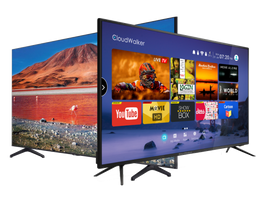
Let Us Help Find Your Perfect TV
Find your new TV
Key similarities
Sports
6.0


6.4
3.2/10
MOTION PROCESSING
8.2/10
60Hz
REFRESH RATE
60Hz
8.0/10
INPUT LAG SCORE
8.7/10
6.6/10
UPSCALING
6.0/10
7.6/10
SDR BRIGHTNESS SCORE
6.7/10
Yes
HLG SUPPORT
Yes
The Samsung CU8000 (LCD) and Amazon Omni QLED (LCD) are both only fair for sports.
The Amazon Omni QLED has a fair response time but poor motion processing, which might blur during fast sports scenes, while its good reflection handling helps in a bright room. On the other hand, the Samsung CU8000 has better motion processing but struggles more with reflections, making it less ideal in well-lit spaces; both have similar viewing angles and gray uniformity, which is somewhat important for a uniform playing field appearance.
Cost
$600


$578
$300
$400
$500
$600
$700
$800
$900
The Amazon Omni QLED (LCD) has a price of $600 and the Samsung CU8000 (LCD) costs $578.
Give feedback
We’re constantly working to improve.
How the Amazon Omni QLED (LCD) and the Samsung CU8000 (LCD) compare to other TVs
Spec Comparison
| Amazon Omni QLED (LCD) | Samsung CU8000 (LCD) |
GENERAL | |||
|---|---|---|---|
| Price | |||
$600 | $578 | ||
Brand | |||
Brand | Amazon | Samsung | |
Release Date | |||
Release Date | September 1, 2022 | March 4, 2023 | |
Full name | |||
Full name | QL65F601 | UN65CU8000 | |
Screen Size | |||
Screen Size | 65" | 65" | |
Screen Resolution | |||
Screen Resolution | 4K | 4K | |
TV FEATURES | |||
|---|---|---|---|
Operating System | |||
Operating System | Fire OS | Tizen | |
Sound Quality Score | |||
Sound Quality Score | 9.2/10 | 7/10 | |
NextGen Ready | |||
NextGen Ready | No | No | |
HDMI Ports | |||
HDMI Ports | 4 | 3 | |
Coax Ports | |||
Coax Ports | 1 | 1 | |
DISPLAY QUALITY SCORES | |||
|---|---|---|---|
Picture Quality Score | |||
Picture Quality Score | 7.8/10 | 5.8/10 | |
Bright Room Score | |||
Bright Room Score | 6.9/10 | 6/10 | |
Gaming Score | |||
Gaming Score | 6.4/10 | 5.5/10 | |
Movies & TV Score | |||
Movies & TV Score | 7.8/10 | 5.3/10 | |
Sports Score | |||
Sports Score | 6.1/10 | 6.4/10 | |
PHYSICAL | |||
|---|---|---|---|
Dimensions w/o Stand (H x W x D) | |||
Dimensions w/o Stand (H x W x D) | 33.4" x 57.1" x 3.2" | 32.8" x 57.1" x 1" | |
Dimensions with Stand (H x W) | |||
Dimensions with Stand (H x W) | Unknown" x Unknown" | 34.4" x 57.1" | |
Weight without Stand | |||
Weight without Stand | 45.4 lbs | Unknown | |
VESA Mount | |||
VESA Mount | 400 x 300 | 400 x 300 | |
DISPLAY | |||
|---|---|---|---|
Color Depth | |||
Color Depth | 10 bit | 10 bit | |
Black Frame Insertion | |||
Black Frame Insertion | Yes | Yes | |
Auto Low Latency Mode | |||
Auto Low Latency Mode | Yes | Yes | |
Contrast | |||
Contrast | 9.1/10 | 4.9/10 | |
Local Dimming | |||
Local Dimming | 6.3/10 | 2.5/10 | |
SOUND | |||
|---|---|---|---|
Speaker Setup | |||
Speaker Setup | 2.0 | 2.0 | |
Speaker Power | |||
Speaker Power | 24 W | 20 W | |
Dolby Atmos | |||
Dolby Atmos | Yes | Yes | |
DTS:X | |||
DTS:X | No | No | |
Shopping
Amazon Omni QLED (LCD)
See more
Dig into reviews and images
Tech Advisor
Jim Martin | April 2023
"This really is a TV designed for the streaming generation ... And it’s good to see support for both HDR10+ and Dolby Vision because it means more of the content you stream will be available in HDR. Overall, the Omni QLED is an impressive TV. It’s pretty bright, has good contrast and – thanks to those quantum dots – vibrant colours."
Get a great deal on the Amazon Omni QLED (LCD) or the Samsung CU8000 (LCD)
About Amazon
Amazon, the largest online retailer in North America, has forged partnerships with TCL and Hisense to produce white-label TVs incorporating their Fire OS software. These Amazon-branded TVs typically compete in the low-end and mid-range segments, offering compelling price points. Leveraging their strong reputation, Amazon has swiftly built brand trust in the TV market despite being relatively new to it. To enhance their popularity, these TVs integrate features from the Amazon ecosystem, including Alexa, providing users with a seamless and interconnected TV experience.
About Samsung
Samsung, a South Korean electronics manufacturer, holds the title of being the largest global TV vendor in terms of units sold. They offer a diverse lineup of TV products that cater to various budget ranges. A notable achievement in recent years is the development of Quantum Dots, a technology that enhances color reproduction, resulting in richer and more vibrant hues. Samsung TVs are well-regarded for their high manufacturing quality and user-friendly software, making them an excellent choice for consumers seeking an intuitive viewing experience.
Give feedback
We're constantly perfecting our model
TV guides you might be interested in
More comparisons for you
Compare Amazon Omni QLED (LCD) vs. TCL S555 (LCD)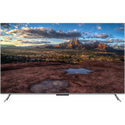 VS
VS


Compare Amazon Omni QLED (LCD) vs. TCL S455 (LCD) VS
VS


Compare Amazon Omni QLED (LCD) vs. LG UP7000 (LCD) VS
VS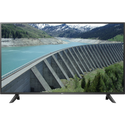


Compare Samsung CU8000 (LCD) vs. LG UR9000 (LCD) VS
VS


Compare Samsung CU8000 (LCD) vs. Sony X77L (LCD) VS
VS


Compare Samsung CU8000 (LCD) vs. Hisense U7K (LCD) VS
VS


FAQs
FAQs about TVs
Why trust us
This information was produced and vetted by the PerfectRec TVs team. We are a product research and recommendation organization that meticulously reviews and evaluates the latest TV information and makes it digestible for you.
By the numbers
385
TVs evaluated
33,110
TVs stats compiled
21
Proprietary TVs ratings developed
175,230
Recommendations made
26,285
Consumer hours saved
About the TV team
Joe Golden, Ph.D
CEO and TVs Editor
Joe is an entrepreneur and lifelong electronics enthusiast with a Ph.D in Economics from the University of Michigan.
Jason Lew
Staff Expert & Software Engineer
Jason is a staff expert and software engineer that has been making laptop recommendations for 7 years and moderates one of the largest laptop subreddits.
Chandradeep Chowdhury
Staff Expert & Software Engineer
Chandradeep is a staff expert and software engineer and expert in televisions and monitors. He’s been making monitor recommendations for ten years.
Jaime Roldán
TVs Expert
Jaime is a Colombia-based TV expert. He is an electronics engineer with 8 years of experience in the telecom sector and has been making TV recommendations for 12 years.
